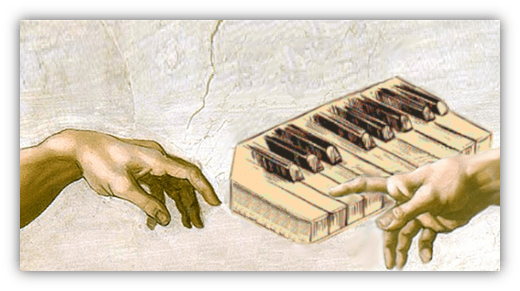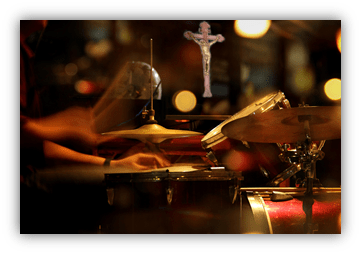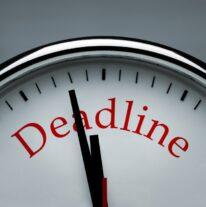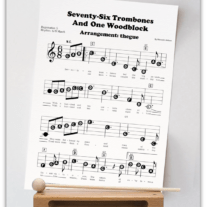After graduating college with a bachelors degree in music, I was an elementary school music teacher for four years.
Following a brief time working a series of temp jobs while I was “finding myself,” I eventually began earning a living as a freelance musician.

This involved playing the piano and working with choirs for four or five churches at a time, and taking whatever other gigs came my way to pay the bills.
At the same time, I was leading a musical ensemble. It had started as a folk guitar group, providing music for the Saturday night mass at my church in the late 80s. By the early 90s, it had gradually morphed into an alternative rock band.
Jazz was for the most part on the back burner.
Though I would occasionally bust it out when hired to play background music at a party or wedding reception.
I improvised at the piano in church quite a bit. But it was of a more reflective nature, with very little references to jazz or blues

More than one person told me I sounded like George Winston, which initially angered me. I didn’t even know who he was.
Did people think I was aping the style of someone that I had never even heard before?
My oldest brother Mike at the time would give me mix tapes of jazz, classical and New Age music that he was into, and thought I might like as well.
Which I did.

When he gave me a cassette of George Winston’s “Autumn”, it took all of one listen for me to have to admit that the comparisons were not completely off base.
Jazz and church continued to stay in their own lanes.
Until something interesting happened.
A friend who was to be ordained a Catholic priest asked some of us who had played together in the band, to provide dinner music for the reception he was having to celebrate his ordination.

We debated what kind of music we would play at a reception for a priest, as this was a new scenario for all of us.
We came up with a list of jazz standards, and an assortment of songs from the 70s that I had in an old piano book my sister MB gave me when I was in junior high school.
It felt like we also needed to do something that related specifically to the religious nature of the occasion.
So we took a bunch of church songs and reworked them in the style of an airport lounge combo. It wasn’t something that was commonly done for obvious reasons. But it just seemed fitting and right for that moment.
The jazzed-up church songs were a big hit at the reception. Most of the people in attendance were church-going friends of ours. They instantly got what we were doing and enthusiastically sang along.

In addition, a table of men studying for the priesthood asked us to engage them in a game of “Stump the Seminarians,” where we would spontaneously play a jazz version of a church song and they would have to name it.
After that, we would go on to play wedding receptions for friends, as well as other gigs, with our brand of what we began calling “liturgical lounge music.”
It was a far cry from the progressive nature of the jazz I had first heard in college, much of which would always remain beyond my abilities.
But traces of it certainly were there.
Overall, we more closely resembled the “easy listening” jazz records that growing up, many of our generation heard our parents play. In the context of providing cocktail music, that made total sense.
Eventually, a full-length CD was recorded, featuring our jazz takes on contemporary Catholic liturgical songs and traditional hymns. I played the piano and the clarinet.
It’s out of print and not available on streaming, but in case you are curious as to how it sounded, I am including tracks from the recording here so you can hear it for yourself.
What we were doing was meant to be a fun venture: combining our faith with our passion for jazz in a lighthearted way that was never designed to be taken too seriously.
But something happened that caused a shift for me. The arrangement of the hymn “Let All Mortal Flesh Keep Silent” had a mystical, contemplative quality to it, much different than the other songs.

And when we were recording, it resonated on a deeper level than any of us had expected.
Prior to that moment, I would have never imagined incorporating “liturgical lounge” into an actual liturgy in a way that would feel appropriate and sincere.
But slowly, it began to happen. At first, I found myself experimenting mostly during rehearsals for my own amusement, but also because I was now starting to hear many of the songs that way and couldn’t resist fleshing them out.
And I sometimes had willing accomplices. Once, a small group of us hired to provide music for a meditative prayer service were running through the music beforehand and suddenly broke into an up-tempo swing version of what was supposed to be a very subdued, prayerful refrain…

…When Norma, the flautist, wildly launched into a raspy flutter tongue jazz riff, the guitarist laughed so hard that he banged his head into a huge stone carving on the wall behind him
It wasn’t long before I found myself more frequently inserting jazz chords, rhythms, riffs, and yes, the good old blues scale, into the music during the mass itself.
It honestly felt like a natural expression of my faith and not at all disrespectful, at least not to me. When I took on a job as full-time music director and was now in charge of the music at a progressive-leaning church, the amount of jazz and blues that worked its way into the mass increased exponentially, until it just became part of the fabric of our worship experience.
If I had any fears that I was going too far, the support of the people helped alleviate them.

If the song during the preparation of gifts sounded like something from one of Vince Guaraldi’s classic Charlie Brown soundtracks?
And there were no objections, and in fact, some people were encouraging me to do even more of it?
I took it as a sign that something good was happening here.
Over the course of time, as I continued to write more of my own liturgical compositions, my love of various forms of jazz inevitably seeped in, as it had with my playing.
Only a fraction of what I have written is jazz-tinged. But it has its place for sure:

- A responsorial psalm that sounds like a Tito Puente mambo.
- A robust worship song in the style of a Sergio Mendes bossa nova.
- A Kyrie Eleison (“Lord Have Mercy”) with subtle hints of Miles Davis’ “Kind of Blue,” to name a few examples.
The incredible open-mindedness and the affirmation of the pastors and the faith community for whom I have served has provided fertile ground for new levels of creativity, and our choir and instrumentalists have been continually game for just about anything.
I have not taken it for granted, as I know far too well that in the broader church, this kind of acceptance is not a given.
All of this led to that recent day:

Playing a jazz standard and improvising on the blues scale – at a Catholic funeral.
It was just instinctive – without even having to question it.
It brought everything full circle. Moments such as this are the destination where jazz, my faith, and “making it up as I go along” have converged. I am grateful for the many experiences along the way that shaped me and have allowed for that to be possible.
And one more thing about jazz:
To me, jazz is akin to life itself. I will never fully grasp its complexities and I will certainly never master it.

Much of it remains a mystery to me, just beyond my reach.
I will always be on the road to greater understanding…
But what a wonderful journey it is, indeed!
Let the author know that you liked their article with a “Green Thumb” Upvote!





That is a gift beyond measure — to be able, within liturgical prayer, to assess the mood of the community you love and provide it the soundtrack that inspires, comforts and, yes, entertains. I trust your community knows how lucky they are to have you.
Thank you, cst! I do feel appreciated and I really do consider myself blessed to be where I am. It just fits.
Wonderful and thoughtful end to this terrific miniseries.
Thanks for taking us on your journey. Well done, and good on you.
Thank you, mt, for your encouragement, and for bringing it to the page the wonderful way you do!
Before I forget, hat’s off to the bass player. Nice solos in “Alleluia” and “Mortal.”
I like your comparison, that jazz and life itself are too multi-faceted to know completely, and to take it a step further, we’re all improvising. Making it up as we go along, seat of our pants, playing by ear. All you can really do is practice and learn from your mistakes.
Nice job, RB!
Well said, v-dog!
And yes, I agree about those bass solos. He’s amazing. The musicians I played with on those recordings were all good friends and top notch players.
How great is this, rollerboogie! Our music during our worship service (Church of Jesus Christ of Latter Day Saints-Mormons) is set from the hymnbook. Not much variation. And that keeps things “safe”, which, personally, I feel comfortable with (with occasional exceptions). But Church adjacent music…at children’s singing time, at funerals, marriages, Church activities…this is where I wish I heard embellishments as you provided. We have no paid anything in our church (ministers, musicians, leaders, etc), so you are lucky if your congregation features any semi-professional musician or better. But I would love to hear what you provided.
I don’t even know the hymns that you featured, but I sure liked hearing them!
Any chance that there’s a way to get the songs from your album?
These files are hosted right here at tnocs.com . Saving a copy for your local device is easy:
If you are on a Windows desktop, hover over the audio file, right click, and select “Save Audio As.”
I’ll imagine that it’s a similar scheme on a Mac.
As an audio pirate (semi-repentant, now that I pay for an Apple Music subscription) I already almost did that! 🙂 But I wonder about the rest of the album.
Thank you, Link. I like hearing about your church experiences.
Because of copyright issues, I could only share the 3 songs that are public domain.
Got it. Understandable.
I love those renditions, particularly “Alleluia Sing to Jesus” and “Let All Mortal Flesh Keep Silent.” Just lovely.
The line between sacred and secular is crooked, blurry, circumstantial, and always prone to change. What we now call black gospel came from holy variations of what even some of its major musicians considered to be devil’s music. Despite the jazz coolness, I think you struck the necessary reverence to do the pieces justice.
Thanks for the write-up!
Thank you, Phylum. Very, very true about the lines between sacred and secular. I don’t even like to use either term anymore, because of exactly what you said. And your insights on the origins of Gospel are dead on.
Straight from the brothels and juke joints to the church, beginning with Georgia Tom Dorsey’s “Precious Lord, Take My Hand”, but not without a boatload of resistance! Don’t know if v-dog has covered it already or plans to, but it would be a great subject to explore further, and one that I am passionate about. Tons of jazz overlap there.
Sure did!
https://tnocs.com/theoretically-speaking-s2-e6-what-makes-gospel-gospel/
Ah great. I look forward to reading this.
This was before I started hanging out here and I missed it.
I’ve enjoyed the journey and the insight. Sounds like a rewarding path you’ve taken, combining two things that obviously mean a great deal to you and which give you personal satisfaction as well serving the congregation.
Great work!
Thank you, JJL@L!
I did a search for gospel jazz on Spotify and was pleased to see Jimmy Scott’s name pop up as the lead track. He performs “Exodus”.
Is gospel jazz, or Christian jazz, a formalized genre, or are there jazz artists who just happen to be openly Christian?
There is always one small section of autobiographical detail that I take delight in. “Norma, the flautist wildly launched into a raspy tongue jazz riff…,” is something I can see and hear.
Thank you for the delightful short answer to the backstory for “Blow Chow”, rollerboogie. I’ve seen Super 8 about twenty times. I get a warm feeling from humorous stories during that era.
You nailed it on Super 8. I was the same age as the characters in the year the movie takes place. I love that movie.
I don’t know too much about Gospel jazz as a genre, but my guess is that you could find a lot of examples of it. There is natural cross over between the two genres. A good deal of the chords and progressions used in Gospel are common in the jazz world and though the two are distinctly different, there is a lot of overlap. As far as “Christian jazz” goes, there was a group under the CCM umbrella in the 80s called Koinonia, which played jazz of the smooth, funky variety. Being that they were primarily instrumental, it was always a little odd that they were classified as Christian music, and I think if they hadn’t been, more people would have heard them, as they were really good. With Abraham Laboriel on bass (think “Call Me Al”), and Alex Acuña on percussion for starters, it’s going to be high-level.